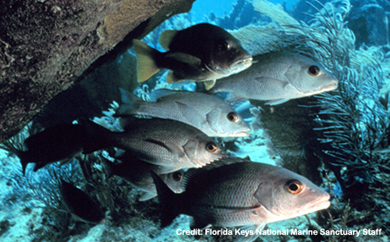Over the past 30 years, we've made tremendous scientific gains in understanding how marine ecosystems work while monitoring the impacts of fishing and other extractive activities on the health of our oceans. What's more, the application of new science, along with critical reforms of key laws and regulations, is leading to more effective policies to manage America's ocean fisheries.
Because of these improvements, we are making progress toward ending overfishing in U.S. ocean waters and have one of the most advanced marine resource management programs in the world. Success stories, as I've detailed in previous articles, span our coasts. Atlantic sea scallop, Gulf of Mexico red grouper, and Pacific lingcod are just a few examples of once-depleted U.S. fish populations that have been rebuilt.
Yet too often, federal managers and policymakers approach these issues by considering only one species at a time, rather than looking at the big picture. This approach fails to make use of a wealth of knowledge that scientists have gained in recent decades. We now know, for instance, that fishing for one species can affect the larger marine food web, and as the International Panel on Climate Change reported this week, rising temperatures are another pressure affecting the health of fish populations and their habitats.
We can and must do better. It's time that decision-makers and federal fisheries managers pursue broader policy solutions that will not only help restore individual species but also promote healthy and robust marine ecosystems -- an approach known within scientific circles as ecosystem-based fisheries management.
- Keep forage fish populations abundant enough to support the larger fish, marine mammals, birds, and other ocean wildlife that depend on them as a food source.
- Protect the habitats that fish depend on for shelter, reproduction, and growth.
- Reduce the incidental catch of nontarget species, a problem known as bycatch.
- Reverse the mindset of "fish first, ask questions later."
- Ensure that fishery management decisions are guided by ecosystem plans instead of on a single species of fish without regard to the health of other species, their common habitat, or impacts on the broader marine environment.
It will also require support from our nation's leaders to continue the scientific research we need to develop an even better understanding of how fish species relate to one another and to their surrounding marine ecosystems. This will help ensure that management decisions for U.S. fisheries are based on science, not regional or partisan politics, and promote the restoration and maintenance of healthy and resilient ocean ecosystems.
In the coming year, a number of important policy decisions could have a profound impact on the future direction of U.S. fisheries management. They will include a national debate on congressional reauthorization of the Magnuson-Stevens Fishery Conservation and Management Act, our nation's primary fisheries law; revisions of national rules that guide fisheries management; and changes to important regional policies that are currently under consideration in fisheries management councils around the country.
To help inform these discussions, I'm kicking off a special series of articles, titled "The ABCs of Ecosystem-Based Fisheries Management." It will explore, as the title suggests, the benefits of a broader fisheries management approach that considers the health of marine ecosystems as a whole. I'll conclude by taking a closer look at upcoming fishery policy debates worth watching as 2014 unfolds, and exploring the potential stakes for those who depend upon healthy and vibrant ocean ecosystems as a source of commerce, sustenance, and recreation.
- Part I--A better way to protect our ocean ecosystems
- Part II--Forage fish: The oceans' little heroes
- Part III--Reducing and minimizing bycatch
- Part IV--Protecting essential fish habitat--homes and nurseries
- Part V--Starting smart
- Part VI--Planning for the whole ecosystem

